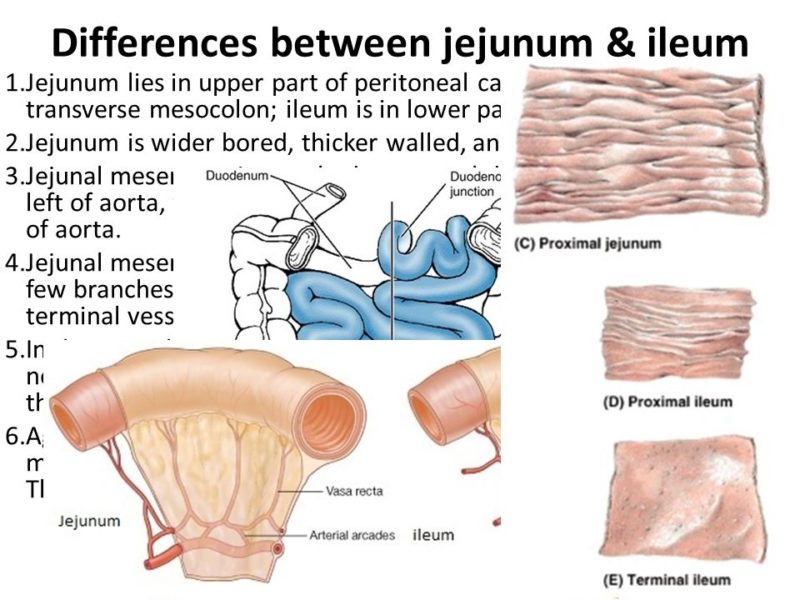What is the difference between jejunum and ileum?
Digestion is the mechanical and chemical breakdown of food particles until they are absorbed into the bloodstream. The process starts in the mouth to the stomach and ends in the intestines. Jejunum and ileum are part of the small intestines.
The core difference between jejunum and ileum is that jejunum is responsible for absorbing fully digested carbohydrates and proteins while ileum tends to absorb foods that are not absorbed in the jejunum.

What is a Jejunum?
The jejunum is part of the small intestines responsible for absorbing fully digested proteins and carbohydrates. It is found between the duodenum and ileum.
It normally begins at the suspensory muscle of the duodenum and an adult human being has about 8 feet jejunum long. It is covered by thin membranes that keep them warm.
The internal wall of jejunum is covered by villi and microvilli which absorb nutrients. Absorption of proteins, carbohydrates, fats, minerals, and electrolyte happen in the jejunum.
What is an Ileum?
The ileum is the part of the small intestines responsible for absorbing the remaining nutrients that were not absorbed by the jejunum.
It is located between the jejunum and caecum. It tends to measure about 11.5 feet long. It has an ileocecal valve which plays the role of emptying the content in the ileum to the colon.
Besides that, the ileum has specialized receptors for absorbing vitamin B12 and bile acid. It has less number of folds in the body.
Comparison Table: Jejunum vs Ileum
| Basic Terms | Jejunum | Ileum |
| Meaning | The middle part of the small intestines for absorbing proteins and carbohydrates | The final part of the small intestines for absorbing the remaining nutrients |
| Correspondence | Found between the duodenum and ileum | Found between jejunum and caecum. |
| Beginning | The suspensory muscle shows the beginning of jejunum | Difficult to identify the starting point |
| Width | Slightly wider | Wider |
| Length | Measure about 8 feet | Measure about 11.5 feet |
| Folds | Tend to be thicker | Tend to be less thick |
| Number of Folds | Has a large number of folds | Have a fewer number of folds |
| Core function | Absorption of proteins, fats, minerals, electrolytes, and carbohydrates | Absorption of non-absorbed nutrients from the ileum |
| Mucosa-associated Lymph Tissue | Has less | Has more |
| Valves | Absent | Present |
Core Differences between Jejunum and Ileum
- The jejunum is the middle part of small intestines while ileum is the final part of the small intestines
- The jejunum is found between duodenum and ileum while ileum is found between jejunum and caecum.
- The suspensory muscle shows the beginning of jejunum while ileum is difficult to spot the beginning.
- The ileum is longer while the jejunum is shorter
- The jejunum is slightly wider while the ileum is wider
- Jejunum has thicker folds while ileum has thinner folds
- The jejunum is responsible for absorption proteins, lipids, and carbohydrates while the ileum is responsible for absorbing the remaining nutrients
- Jejunum has less mucosa-associated lymph tissue while ileum has more
- The ileum has a valve at the end while the jejunum has no valve
- The ileum is highly vascularized with blood vessels while jejunum has simpler blood supply vessels.
- The jejunum has a large number of folds while the ileum has fewer folds
Similarities between Jejunum and Ileum
- Both are part of the small intestines
- Both are folded part of the intestines
- Both have slightly alkaline or neutral inner surfaces
- Both are responsible for absorbing nutrients
- Both are covered by the mesentery
You May Also Like:
Comparison Video
Summary
Both jejunum and ileum are responsible for absorbing nutrients. They are located at the lower end of the small intestines. The location helps to spot the difference between ileum and jejunum.